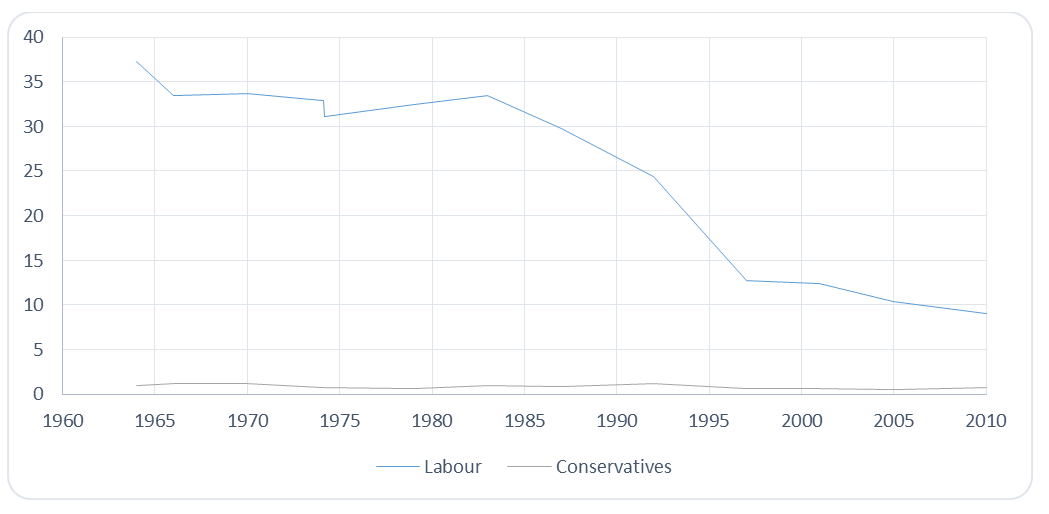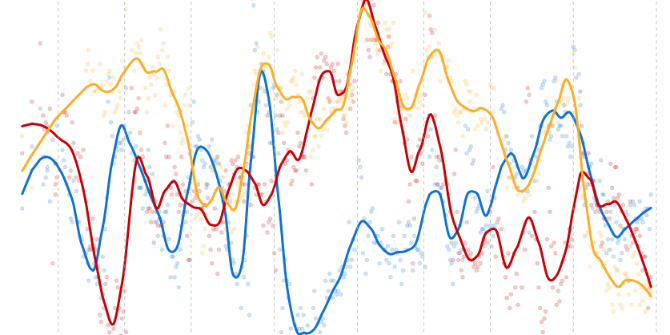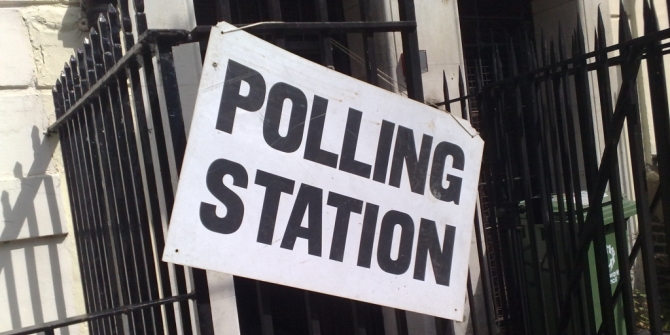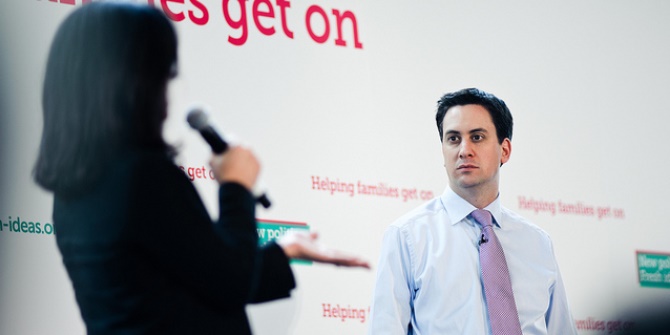 How does the social background of MPs and candidates influence voting behaviour? Analysis by Oliver Heath of class voting in Britain between 1964 and 2010 shows that the social cues that parties send voters matter and that working class voters are relatively more likely to vote Labour when the party contains many working class MPs.
How does the social background of MPs and candidates influence voting behaviour? Analysis by Oliver Heath of class voting in Britain between 1964 and 2010 shows that the social cues that parties send voters matter and that working class voters are relatively more likely to vote Labour when the party contains many working class MPs.
The representation of women and ethnic minorities in Parliament has been on the increase in Britain over the last few years; however, the representation of other social groups, particularly the working classes has been declining. This was bought into sharp focus following the 2010 British General Election, when the coalition cabinet was almost entirely composed of millionaires and contained more (rich) ethnic minorities and women than it did people from working class backgrounds. The situation on the Labour side of the house is hardly any better – with recent concerns openly expressed among some backbenchers that the party has been ‘high jacked by a metropolitan elite.’
The Figure below depicts the changes that have taken place in the social background of Labour and Conservative MPs over the last 50 years. Although never high compared to the proportion of the working class in the population, the number of MPs with a background in manual work has fallen dramatically. In 1964, 20 per cent of MPs had a working class occupational background, but by 2010 just 5 per cent of MPs had such a background. This decline is almost entirely due to changes which have occurred within the Labour party, who were traditionally expected to represent working-class people. In 1964, Labour was not just a party for the working class, but was also a party that was substantially comprised of the working class, with over 37 per cent of the MPs coming from manual occupational backgrounds. By 2010 this fell to just under 10 per cent.
Figure 1: Working Class MPs in Britain (%), 1964-2010
The result of these changes in recruitment has been a parliament with many fewer voices able to speak from working class experience, particularly on the Labour side of the House. Such changes in MPs’ occupational background have made parliament much less representative of the broader British population, and the Labour party much less representative of the working class whose interests it was traditionally supposed to represent.
Does any of this matter? In a recently published article I examine what impact, if any, changes in the social background of political representatives in Britain have had on the ways in which voters participate in the political process. The arguments for why it might matter have a certain intuitive appeal. MPs from privileged backgrounds may be ‘less in touch with the mass electorate’ and less in touch with working class voters. To a working class voter, it may therefore be more credible when a politician from a strong working class background says that they will stand up for the underprivileged, than when a multi-millionaire member of the aristocracy says the same thing. Thus, if a party contains many working class MPs, working class voters may be more likely to think that the party in question represents and stands up for their interests.
The results of the analysis show that the decline of working class MPs in the Labour ranks has had a substantial impact on the relative popularity of the party among working class voters, even controlling for a host of other factors commonly associated with class voting. Working class people are significantly more likely than middle class people to vote labour when the party contains a substantial number of working class MPs, and variation over time in the number of working class Labour MPs in office closely tracks the strength of class voting. For example, all other things being equal, the difference between a person from the middle class and the working class voting for Labour is about 42 percentage points if there is a high level of social difference between the parties, but only 25 percentage points if there is a much lower level of social difference between the parties. Over time the two parties have become ideologically more similar, but also socially more similar, and it is this social similarity that appears to have the strongest impact on class voting.
There is also evidence to suggest that these processes operate at the constituency level as well: working class voters tend to be more likely than the middle class to vote Labour when the Labour candidate is working class, and working class voters are more likely to regard Labour as being left wing when they have a working class candidate in their constituency.
Although the loss of working class MPs has not hurt Labour electorally yet (and may even have made the party more popular among the middle classes), it now faces stiff competition for working class votes from Ukip on the right and the SNP on the left. The sense that the party no longer represents the issues and concerns of working class people, and that it is ruled by an out of touch metropolitan elite makes it particularly vulnerable to these challenges. As the run-up to the election approaches, Labour may find that it is the messenger rather than the message that is their biggest obstacle to winning back these votes.
One implication of this research is that the social composition of parliament matters. It influences how people participate in the political process, and, potentially, it might also influence how people view politics and engage in politics more widely. This suggests that there may be empirical as well as normative implications to the on-going debate about the social representativeness of political representatives. Recent concerns about the extent to which MPs are socially representative of the wider population, both in terms of class, age, sex, region and ethnicity may have serious implications for how people from different backgrounds relate to politics.
Note: This article gives the views of the author, and not the position of the British Politics and Policy blog, nor of the London School of Economics. Please read our comments policy before posting.
 Oliver Heath is a Reader in Politics at Royal Holloway, University of London.
Oliver Heath is a Reader in Politics at Royal Holloway, University of London.









This graph almost mirrors the economic impact of Neo-Liberalism on the economy as a whole, I certainly believe that Oxbridge economists have a lot to do with the misrepresentation of politics and the mythology that the public sector is bad and the private sector is good.
Most leading politicians come from this background and hence their endorsement of these disastrous policies, it’s not really about class as such but the self serving attitudes built up since 1970 that ordinary people are the servants of capital and that democracy must subjugate itself to the will of the few, or capital will fly wherever the greatest return is.
Global economics really doesn’t serve the interests of ordinary people, people generally understand that there is something radically wrong wherever they are in the world, but do not fully understand why, hence the feeling of disenfranchisement. That of course spreads across all sectors of the community and the middle classes are finding life to be just as difficult as the working classes, the divide between the classes is narrowing, except when it comes to the mega rich who vacuum up all the wealth available.
With our knowledge now, we understand how money is created, that means a new paradigm that reflects the needs of ordinary people is essential in order to avoid the current dysfunction of society. We do not need to trade globally or sit around waiting for some benevolent billionaires to come along and exploit our talents so that they can make even more profit for themselves, we can now plan our futures for ourselves and create a society that serves us all. This of course is not a pipe dream but could be a reality, people need to understand money creation and reject neo-liberalism which the IMF has just declared that they “oversold”, these policies transferred wealth and power upwards to the detriment of people as a whole.
Labour became conservatives mk2 I’m working class with degrees
Very interesting but is there a conflation of “working class” with those with a “manual occupational background”?
What isn’t clear from this is how these figures compare with changes in the proportion of the overall population that are in working class occupations. The article talks of a “background in manual work” and since 1964 the ONS figures show that the UK has increasingly moved to a service economy and away from manual work.
In this world would you not naturally expect the proportion of MPs from “manual occupational backgrounds” to decline in line with the shift away from manual jobs over the last 50 years? In fact would it not be more concerning in terms of MPs representing the population if their backgrounds hadn’t changed to be more reflective of the population?
This recent change could be down to the reduction of impact of unions in more recent years. Union members would be more likely to vote Labour even the the party leaders were middle class as the influence of the unions could still be felt. With fewer people now in unions where is this voice now heard other than for voting more for people like them including UKIP and the SNP.
This is interesting, but I’m not sure it really captures why working class voters are increasingly turned off by Labour.
In 1935, according to David Kynaston, two thirds of Labour MP’s elected were from manual occupations (Dockers, Steelworkers etc). Yet in the 1945 landslide two thirds were middle class (Lawyers, Civil Servants and so on). This dramatic shift occurred before the first majority Labour government, and it shows that at least in terms of the social composition of its MPs Labour has been a middle class party throughout the post war era.
So I wonder why working class voters were happy to support a predominantly middle class Labour party in 1945, but were increasingly unlikely to do so after 1964? Or to put it another way: if the social composition of the parliamentary Labour party is an issue now, why was it not before/
I suspect that this reflects a long term attitude divide between much of Labour’s middle class leadership and its working class base, based on a variety of issues but perhaps above all on immigration.